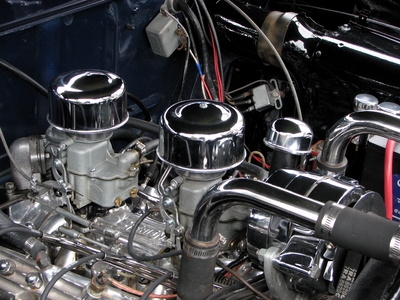
You should check the belts on your BMW at least every 3,000 miles. In the case of the fan belt, replacement is required when the belt shows signs of tearing, fraying or cracking. Cracking is usually located on the inside of the belt and can cause loud noises in the car. It is easy to replace the fan belt in your BMW and install a new one. The main concern is handling the fan, but installing a new fan simply requires patience, tools and attention to detail.
Remove the engine cover underneath your BMW with a Phillips head screwdriver. There are nine screws that will need to be loosened.
Place the water pump pulley tool on the left side of the engine over the water pump pulley hex head. With the tool on the hex head, turn the fan nut clockwise to loosen it with a large wrench. The special tool for the water pulley is required in order to counteract the torque from the wrench. Be careful with the fan blades to avoid damaging them. If they are damaged during reassembly, they can cause the fan to explode while the engine is running.
Loosen the nut holding the fan to the engine then remove the fan by lowering it out from beneath the car.
Locate the main serpentine belt tensioner where the fan was previously. Use a 13 mm socket wrench and extension to loosen the two bolts located to the right of the belt tensioner spring. Once you loosen these bolts, the belt tension will be relieved, indicated by a popping noise.
Remove the fan belt from the engine by slowly pulling it out.
Set up the belt tensioner by pre-tightening the 13 mm bolt to pick up tension but do not tighten it to the extent that the tensioner cannot be turned. Use a 17 mm socket to turn the large hex clockwise until the 10 mm bolt clicks into its slot. Once this occurs, tighten the 13 mm bolt as much as possible.
Install the new fan belt by lying under the front of your BMW and attaching the belt so that all of the pulleys are aligned with the grooves of the pulleys in the car. You should be able to see the large outside lips of the ribbed pulleys if the belt is installed properly. If the belt appears to be on the edge of a pulley and could fall off, you will need to reposition it.
Use a 1/2-inch ratchet with a 3-inch extension and 17 mm socket to turn the nut of the large belt tensioner. Use a 3/8-inch ratchet with a 6-inch extension and 13 mm socket to secure the tensioner once it has been lifted back into its proper position. Tighten the 13 mm bolt attached to the 17 mm nut to take up the slack but be careful not to tighten this bolt to the point of inhibiting rotation. This bolt will be the higher bolt, with the other 13 mm bolt underneath it. Turn the 17 mm nut attached to the 13 mm bolt you just tightened. Turn this nut counterclockwise until tight. Finish tightening the 13 mm bolt then tighten the second 13 mm bolt.
Reinstall the fan by reversing the removal process, inserting it through the bottom of the car. Do not apply excessive force to the blades of the fan. Return the fan to its original location on the water pump pulley then carefully turn the blades to get it started on the threads. Use the wrench to tighten the nut. Use the special tool for the water pump pulley on the opposite side of the pulley, tightening the nut by pushing it counterclockwise with the wrench. It will feel as if you are pushing the nut backwards because the fan uses left-handed threads.
Check the condition of the fan, ensure that the fan belt is on the pulleys and the belt has the right amount of tension. Start the engine in order to test for noises but don't stand too close to the fan. In the event that it explodes, you could be putting yourself in serious danger. If you are confident that everything is in working order on your BMW, replace the engine cover underneath the car and tighten the nine screws.